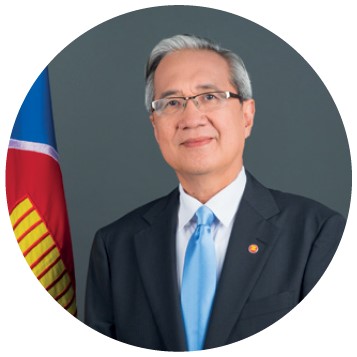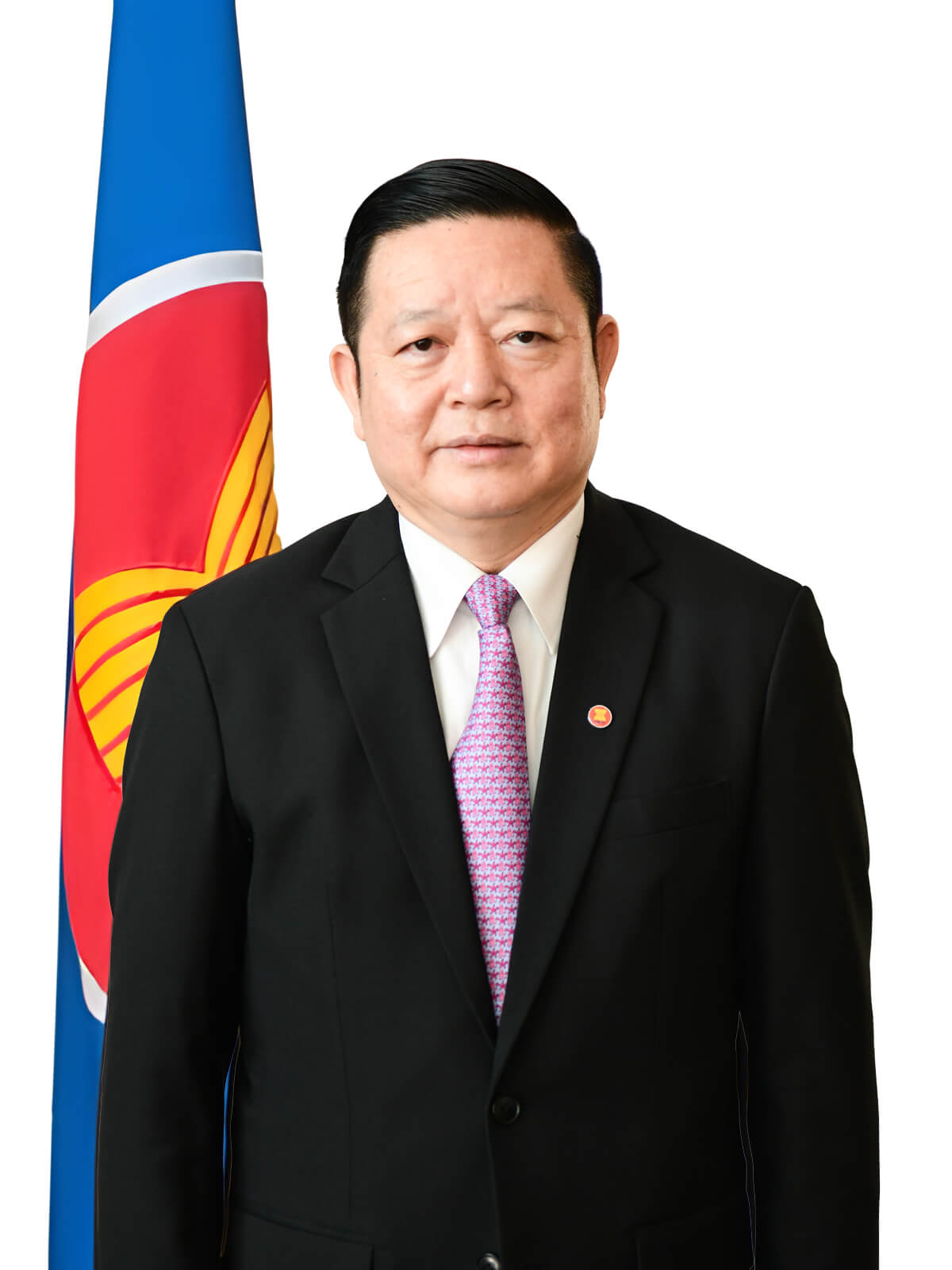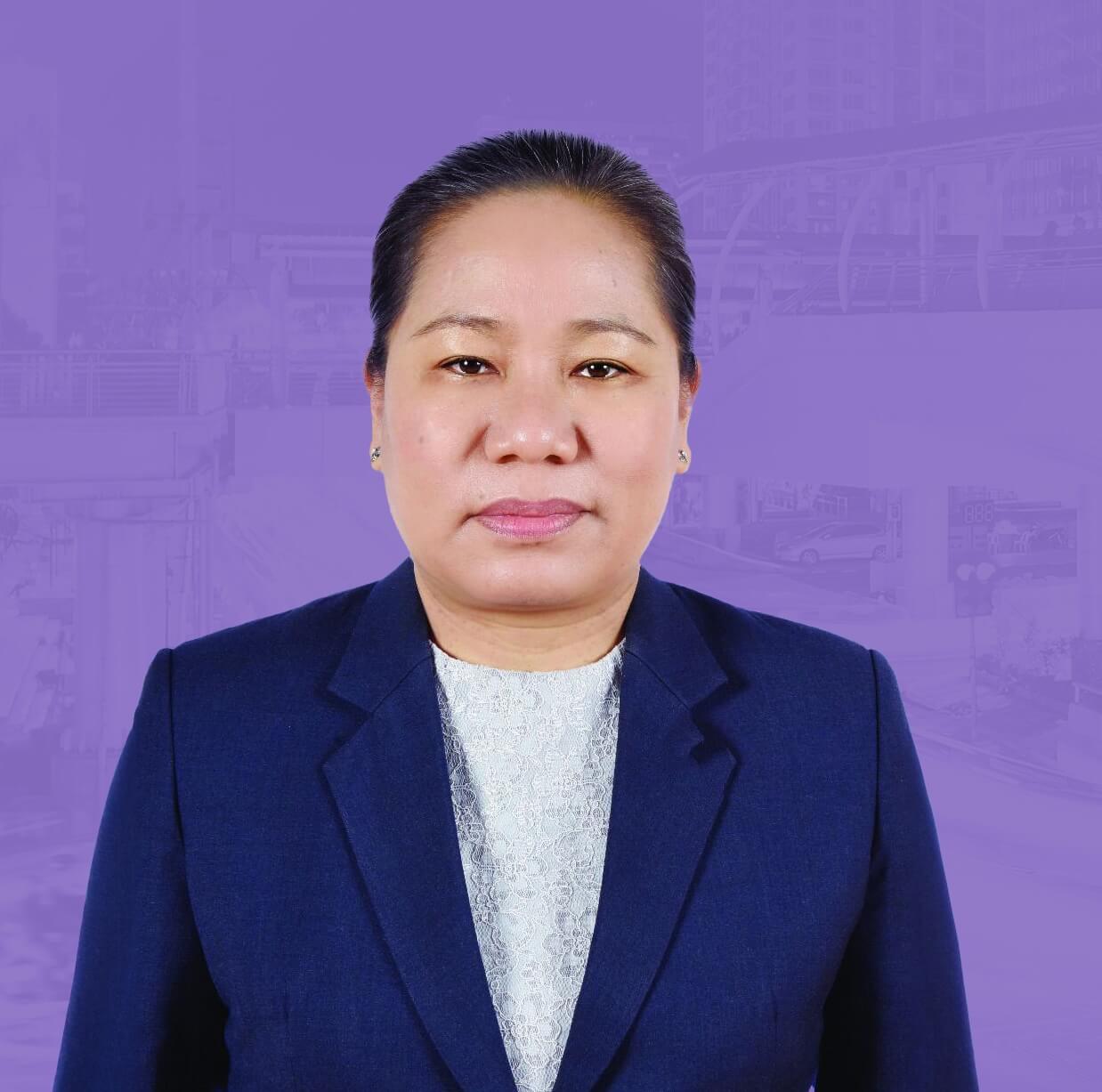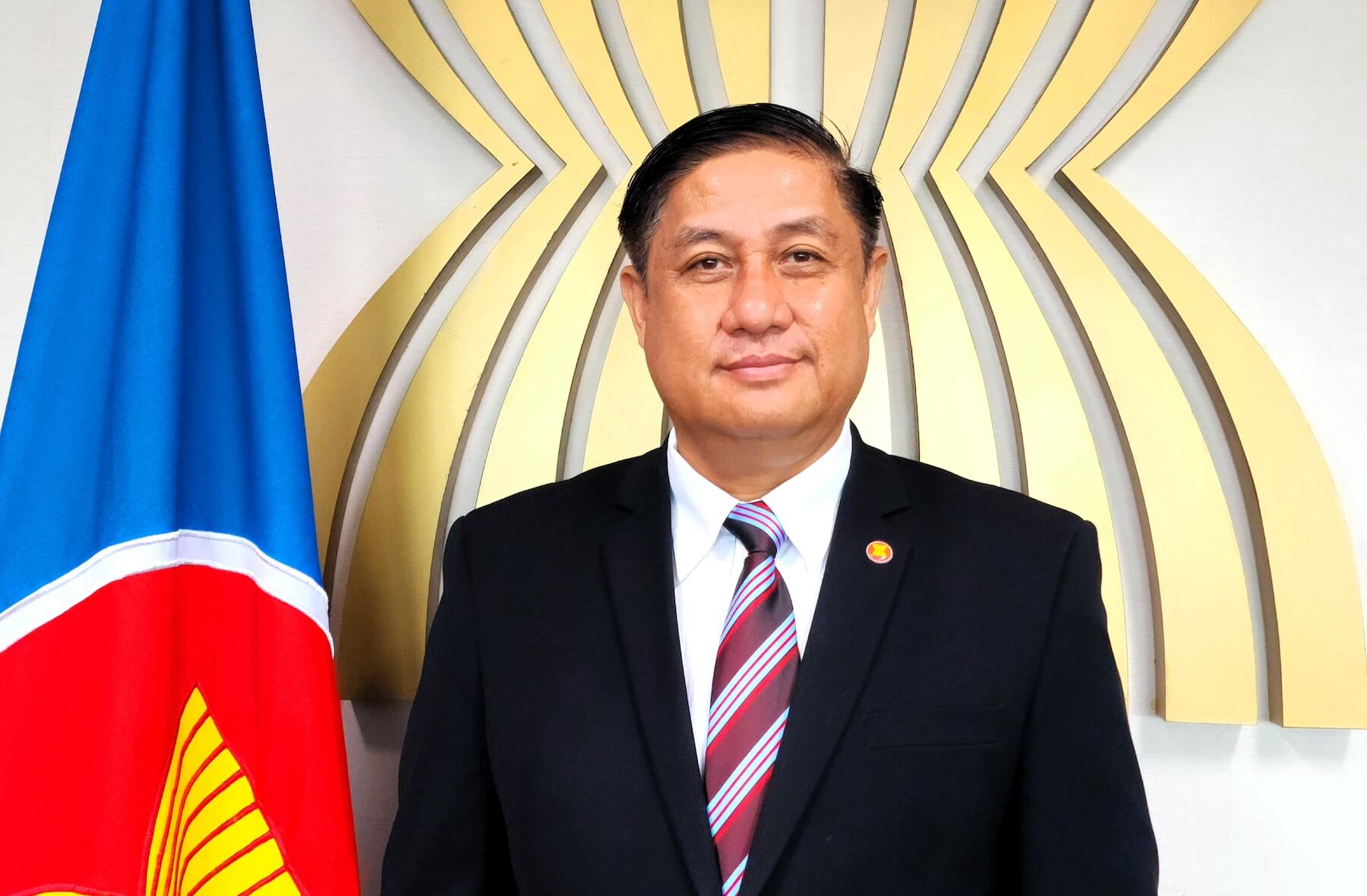


Dr. Aladdin Rillo, Deputy Secretary General of ASEAN for the ASEAN Economic Community, talks to The ASEAN about the economic impact of COVID-19 and development of the ASEAN Comprehensive Recovery Framework to guide the regional bloc’s post-pandemic recovery efforts.
How has ASEAN been impacted by the COVID-19 pandemic? Who has been affected the most?
The unprecedented scale of COVID-19 has taken the world by surprise. The pandemic has generated adverse impacts on market confidence, financial markets, the travel sector, supply chains, and other vulnerable sectors—all these contribute to the downward revisions of growth outlook in all ASEAN economies in 2020, albeit at varying degrees. As for 2020, it is now forecasted that the Southeast Asian region’s economy will contract by 3.8 per cent, before rebounding to a 5.5 per cent growth in 2021. The majority of ASEAN Member States are expected to experience recession this year, some deeper than others; the remaining few will see either stagnation or a much more modest growth that the region has seen in the past.
This pandemic is like no other crises that ASEAN has experienced before, especially given that the decline in productive capacity, output, and employment has been much larger and faster during the present crisis compared to those that occurred during the Asian Financial Crisis in 1997 and the Global Financial Crisis in 2008. The pandemic has put millions of jobs at risk, whilst businesses, especially micro-, small and medium enterprises, struggle to stay afloat. At the individual level, low-income and informal workers, and women, are likely to be hit harder, at least partly due to uneven access to social security benefits. The costly spillovers are already evident across sectors hardest hit by the pandemic, such as tourism, aviation, manufacturing, transport and retail. Inevitably, the COVID-19 pandemic is likely to harm development prospects, exacerbate inequality, and slow the progress in reducing poverty.
How effective do you think are ASEAN responses to date?
ASEAN has responded early and swiftly to mitigate the spread of COVID-19. ASEAN Member States have moved quickly to ensure macroeconomic stability and financial stability. Most, if not all, have rolled-out various policy measures and stimulus packages to mitigate the damage from the pandemic on the economy, through targeted welfare support for the vulnerable goods, wage subsidies, and others.
Member States’ measures to address the COVID-19 pandemic fall into three broad categories: fiscal stimulus packages; monetary policy and financial measures; and sector-specific measures and interventions. The correct-targeting and effectiveness of these social and economic stimulus packages are vital to sustain economic activities, jobs, and livelihoods over the next few years for the economic recovery. As a region, ASEAN continues to be steadfast in helping one another, and to work collectively in combating the pandemic.
ASEAN Leaders and ministers have, since the onset of the COVID-19 outbreak in February, affirmed their commitment to work together to respond to and mitigate the public health crisis and socio-economic impact of the pandemic. Such a spirit is echoed from the highest political level to the different sectors of the ASEAN Community, from health, trade, agriculture, labour to social welfare.
Recognising that a global pandemic cannot be tackled by any country or region alone, ASEAN has also strengthened its cooperation with dialogue partners in strengthening its health responses and to ensure the continued flow of trade in goods and services, particularly within the region, and especially for essential goods such as food and medical supplies;
On the economic front, ASEAN was committed from the onset of the crisis to keep markets open, ensure the normal flows of trade, and supply chains connected, particularly for essential products. The ASEAN economic ministers, at their Special Meeting on 4 June 2020, adopted the Ha Noi Plan of Action on Strengthening ASEAN Economic Cooperation and Supply Chain Connectivity in Response to the COVID-19 Pandemic, and efforts are now underway for its implementation.
Other key COVID-29 responses include the establishment of the COVID-19 ASEAN Response Fund, the work towards the establishment of ASEAN regional reserve of medical supplies and the standard operating procedures for ASEAN response to future public health emergencies; as well as the development of an ASEAN comprehensive recovery framework.
So far, the region has been swift and effective in securing the relevance and contribution of the ASEAN platform to efforts to combat COVID-19. But it is still a long road ahead for recovery. While understandably, the top priority for ASEAN now is to contain the virus, the region’s ability to prepare for recovery along the way will determine the effectiveness of its response beyond the short term. This is a very unusual time, and we cannot afford to stay within our comfort zone and some bold measures will be needed.
As announced by Leaders at the 36th ASEAN Summit, ASEAN is developing an ASEAN Comprehensive Recovery Framework. Why is this necessary and how would the document be useful to the region’s recovery?
Building back better in post-pandemic recovery is not an easy task. ASEAN needs to strike a right balance between lives and livelihood, or else risk losing everything. Some Member States have shown initial success in containing the spread of COVID-19, while few others are grappling with the emergence of new outbreaks. While ASEAN is not short of COVID-19 response initiatives from different sectors, the impact of the crisis is expansive, and comprehensive. Effective recovery efforts, therefore, require a holistic, comprehensive, and coordinated response.
While it started off as a public health crisis, time has shown that COVID-19 has evolved into an economic crisis. Effective response efforts must therefore go beyond the health sector to also mitigate the impact on and support the economy and livelihood of the people. It requires a committed journey to reform socio-economic systems and the longer term endeavour to embrace the “new normal,” strengthen institutions and streamline regulations as well as enhance participation of all stakeholders including the private sector, civil society, and dialogue partners.
The ASEAN Comprehensive Recovery Framework will serve as an exit strategy for the region, taking it through the reopening and recovery stages, towards longer-term resilience, preparedness, and competitiveness.
What can we expect to see in the framework, and how can the people in ASEAN benefit and contribute?
The ASEAN Comprehensive Recovery Framework, which will take a whole-of-ASEAN-community approach underlines ASEAN’s commitment to pursue post-pandemic recovery that is holistic, pragmatic, durable, long-lasting, and inclusive, giving due consideration to the hardest hit sectors and vulnerable groups, and capable of putting the region towards a robust and resilient recovery. More specifically, the framework will focus on actionable and impactful measures that will contribute to the enhancement of our health system; strengthen human security; allow the region to maximise the potential of intra-ASEAN market and broader economic integration; accelerate inclusive digitalisation; and pave the way for ASEAN to build back better into a sustainable and resilient future.
Such a framework will address both the immediate fundamentals which will benefit the region and the ASEAN community, e.g. macroeconomic and financial stability, supply chain connectivity, while minimising any long-term impact on productivity by enhancing preparedness to rebuild the economy in the aftermath of the pandemic. Furthermore, ASEAN recognises the important role its stakeholders can play and contribute in the recovery of the region and the framework. As such, ASEAN will pursue active and constructive engagement with the region’s private sector, civil society organisations, and other stakeholders. ASEAN will need all stakeholders including the private sector, academe, and civil society to engage actively and effectively, identify concrete recommendations, and provide feedback on the outcomes of ASEAN integration on the ground.
Apart from disseminating relevant information concerning ASEAN’s initiatives to various communities across the region, as well as providing the latest on-the-ground information to support informed policymaking at both national and regional levels, ASEAN stakeholders will also play a key role in the implementation of the recovery framework and its implementation plan.
What lessons have been learned from this crisis and how can ASEAN be better prepared for future risks and vulnerabilities? What needs to be changed or improved?
The pandemic crisis has highlighted that such health and economic shocks have little regard to national borders given the interconnectedness and interlinkages of economies and society. As the region looks forward to the post-pandemic future, it is important for ASEAN to plan carefully for the post-recovery. Thus, this recovery period is an opportunity for ASEAN to examine common challenges encountered during the COVID-19 pandemic, assess economic implications, and discuss possible solutions to facilitate recovery. Furthermore, the pandemic has also exposed longer-term vulnerabilities to be addressed in the region, namely large informal sectors, inadequate social protection, deficient health sector capacity, and lack of established mechanisms for emergencies.
The COVID-19 pandemic has also shown that cooperation is more important now more than ever in the face of a global crisis. ASEAN needs to strengthen regional collective resilience which will be integral to containment efforts and to safeguarding socio-economic stability, employment and livelihoods. Cooperation and stakeholder engagement have proven vital for a more resilient and inclusive ASEAN, requiring collaborations and a participatory approach to expand opportunities for all segments of society, particularly the vulnerable groups, and highlighting that the post-pandemic should not be business as usual.
The crisis has provided the momentum for digital transformation. Digital technologies allowed us to stay connected and continue learning. They also supported businesses and will underpin the region’s future growth potential. At the same time, the rethinking of a post-COVID-19 world yielded an opportunity for ASEAN to re-examine our approaches and realign our growth path to one that is more sustainable and resilient. Last but not least, the crisis has meant that now more than ever, the stakeholders expect ASEAN to deliver concrete benefits for the people. This pandemic is an opportunity for ASEAN to rebuild towards a stronger, more resilient, inclusive, and sustainable future.








